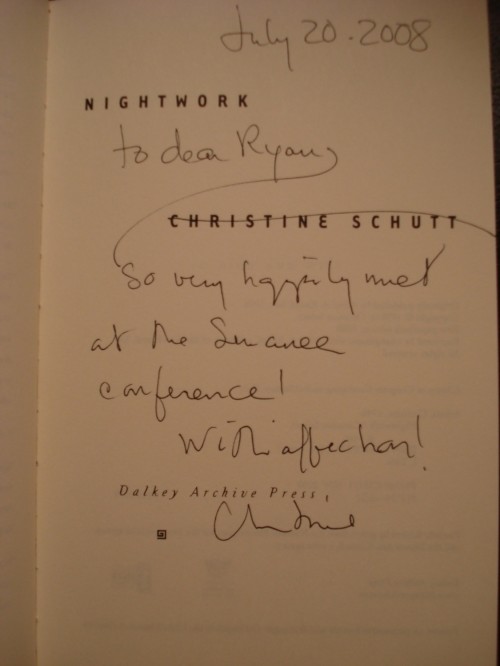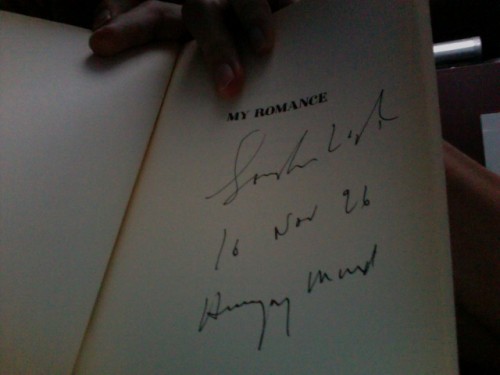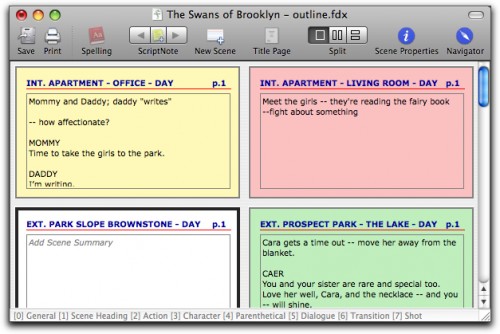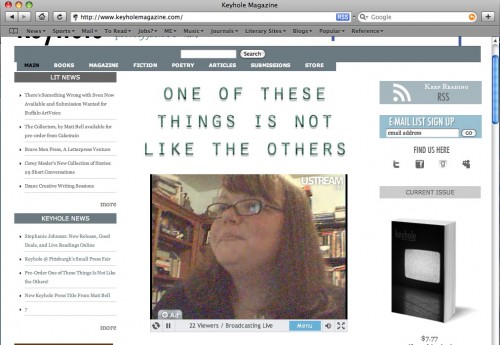My Favorite Author Signature

Aside from the signatures that a few of my writer-friends have written to me in their own books, my favorite author signature is the above greeting from Christine Schutt in her collection Nightwork.
I had admired Schutt’s writing for a while, and then had the neat opportunity to take a workshop from her at Sewanee. Her way of talking about language (about which Justin has already posted) and how she applied her careful sensibilities to a few of my own stories really helped me become aware of my own sentences in new ways. Simply to be able to speak and work with her after having read and reread Nightwork and A Day, A Night, Another Day, Summer was incredible.
As a result, hers is the signature that means the most to me.
What about you? Feel free to email a pic if you have one, so I can add it to the post. Or share in the comments. Also, Jacket Copy has a similar post on author signatures and a gallery of photos. Send them pics too? You can also click over to this page of scanned author signatures if you’d like to get some ideas.
Here’s another signature, this one sent in by Blake: Gordon Lish.

Fellner Speaks
I’m a little late on this, but if you’ve not already seen it, Fellner’s “Final Words About the ‘Firm'” has been posted.
Abramson posted another long response, saying of HTMLGIANT
(unfortunately it may be the least constructive, on the whole, of the dialogues out there, largely because at least one recipient is continuing to insist that I threatened to sue Steve Fellner; I guess Steve and I will have to agree–jointly–to disagree with her on that)
I’ll also update the original HTMLGIANT post with links to other discussions as I find them.
Abramson Leslie Consulting v. Steve Fellner

Recently, and just in time for the fall application season, Abramson Leslie Consulting opened for business with a domain registered to GoDaddy and a serious-looking website. The firm calls itself “the first-ever consulting firm designed exclusively for applicants to Master of Arts (M.A.), Master of Fine Arts (M.F.A.), and doctorate (Ph.D.) in Creative Writing Programs.”
Shortly thereafter, poet Steve Fellner posted a critique of Abramson Leslie Consulting(ALC), saying it “seems corrupt,” “is evil,” and “is pure greed.” C. Dale Young and Eduardo C. Corral, among others, linked to Fellner’s post.
Several hours later, Fellner removed the post for “legal issues” (and today he removed the post that said he had removed the post for legal issues).
Given the recent controversy here at HTMLGIANT, I have to say that what worries me about the Fellner thing is that, due to some “legal issues,” whatever those were, Fellner decided to delete his criticism of ALC; fortunately, this was an ineffective, though no less meaningful act, as the post is still widely available online (not Fellner’s fault). Thanks to Google, you may read Fellner’s post, titled “Why a Creative Writing ‘Firm’ May be the Most Unethical Entity in the Literary Community At Large,” in your Google Reader – simply follow Fellner’s blog, Pansy Poetics, and the post will show up in the feed. (Update: the Google cache snapshot is no longer accessible.) Here’s a tidbit from Fellner’s post, in which he questions the firm’s basic concept:
Or am I reading this “under construction” website wrong? Am I supposed to read this as a parody? As a satire of the idea that one should ethically manipulate their art to receive possible help from other poets and fiction writers? Is the firm also broadly mocking Kaplan Education Centers? Where students pay a tidy fee to improve their test scores? Where test scores are considered to be the measure of excellence? Is the firm ridiculing the inherent nature of MFA programs? That within colleges, institutions that offer grades, art is something that be measured and assessed with perfunctory, mechanical accuracy?
I’d really be interested to know more details on the legal issues behind Fellner’s removing his post.
Now direct your attention to the latest post about ALC at Seth Abramson’s blog. If you’d like to read the whole thing, go ahead. But I’ll just quote the last bit for you:
what we (the eight souls presently committed to ALC) are doing not only comes with a long line of precedent both within the poetry community and without, but adheres to our own–and any–standard of business ethics, personal ethics, and the ethics of being members of a community where just finding the community, i.e. a genuine sense of community, in the first place sometimes seems impossible. And with all the gossip and nonsense on the blogs these days–the non-reality-based analyses, the cruel attacks, the rubber-necking/flame-fanning, and the scurrilous presumptions and accusations–it’s no wonder a young writer would be looking somewhere other than the blogosphere for some help, advice, support, guidance, and honesty. Such things are in short supply these days, and those who try to give them don’t fare any better in the gossip mill, it sometimes seems, than those who sole contribution to this community is to do all they can to burn it down.
I have more to say on this, but haven’t the time to articulate it intelligently, so for now I’ll just leave it at that.
Feel free to discuss.
Update: follow Daniel Nester, No Tell Motel, and Elisa Gabbert for more discussion.
Update: Thanks to Corey Spaley for pointing us to this post at Abramson’s blog, in which Abramson states he did not email Steve Fellner.
The Original of Laura

Knopf is publishing the book in an intriguing form: Nabokov’s handwritten index cards are reproduced with a transcription below of each card’s contents, generally less than a paragraph. The scanned index cards (perforated so they can be removed from the book) are what make this book an amazing document; they reveal Nabokov’s neat handwriting (a mix of cursive and print) and his own edits to the text: some lines are blacked out with scribbles, others simply crossed out. Words are inserted, typesetting notes (“no quotes”) and copyedit symbols pepper the writing, and the reverse of many cards bears a wobbly X. Depending on the reader’s eye, the final card in the book is either haunting or the great writer’s final sly wink: it’s a list of synonyms for “efface”—expunge, erase, delete, rub out, wipe out and, finally, obliterate. (Nov.)
question about toilet paper
What is the correct way to hang a roll of toilet paper? I have seen it both ways. What do you prefer and why? Edited to add: Are there more creative ways of hanging toilet paper?


Stephanie Johnson Reads Online at Keyhole

Just caught the last few minutes of Stephanie Johnson’s live web-reading over at Keyhole to promote her book One Of These Things Is Not Like The Others and general good-feeling web-literature emotions. Great stuff; I enjoyed it a lot. She read two pieces (one was the title piece of the collection).
Stephanie will read again tomorrow at 8pm CST and Thursday at 8pm CST. To watch live, access Keyhole‘s website or go to the UStream link. It’s pretty simple to figure out; I didn’t have any trouble.
You can also chat with Stephanie after the reading, though you may have to do it through a UStream account.
You can watch an archived version of tonight’s reading here.
“The Planet Trillaphon…” by David Wallace
 Perhaps this is old news for some, but Tin House has republished an early David Foster Wallace story, which was, according to Rob Spillman, only previously available in Wallace’s college literary magazine, The Amherst Review. The story is titled “The Planet Trillaphon As It Stands In Relation To The Bad Thing” and is available online in various PDF forms (though I hadn’t even known of its existence until I saw this issue of Tin House).
Perhaps this is old news for some, but Tin House has republished an early David Foster Wallace story, which was, according to Rob Spillman, only previously available in Wallace’s college literary magazine, The Amherst Review. The story is titled “The Planet Trillaphon As It Stands In Relation To The Bad Thing” and is available online in various PDF forms (though I hadn’t even known of its existence until I saw this issue of Tin House).
I’m happy to have discovered the story.
Here’s the first paragraph:
I’ve been on antidepressants for, what, about a year now, and I suppose I feel as if I’m pretty qualified to tell what they’re like. They’re fine, really, but they’re fine in the same way that, say, living on another planet that was warm and comfortable and had food and fresh water would be fine: it would be fine, but it wouldn’t be good old Earth, obviously. I haven’t been on Earth now for almost a year, because I wasn’t doing very well on Earth. I’ve been doing somewhat better here where I am now, on the planet Trillaphon, which I suppose is good news for everyone involved.
You can read the rest of the story by clicking over to this PDF file.
July 27th, 2009 / 11:02 pm
Moon Publicity
I found this bit on the Writer Beware blog: supposedly, a company called MegaNova is planning to sell the rights to robot technology that would allow one to embed a message/logo/advertisement into the robots’ programs so that the robots could then trace the message/logo/advertisement into the dusty surface of the moon. Call it MoonPublicity. What does everyone think? Hoax?
Really really hope this is real. Really want to live to see the Year of the Depend Adult Undergarment finally happen.
Attention Houston HTMLGIANT Readers
 NANO Fiction will launch a monthly reading series this September at Kaboom Books.
NANO Fiction will launch a monthly reading series this September at Kaboom Books.
The editors write:
To commemorate the series, there will be a limited edition mini-chapbook produced combining each month’s readers. Chapbooks will be available for purchase for a dollar a piece.
Visit their site for details.
July 23rd, 2009 / 4:35 pm
